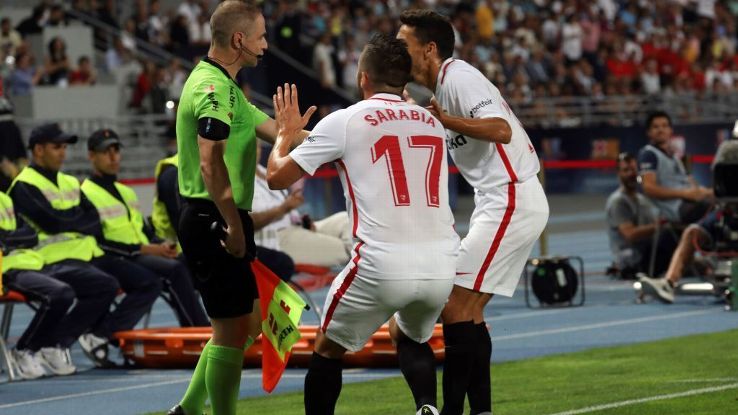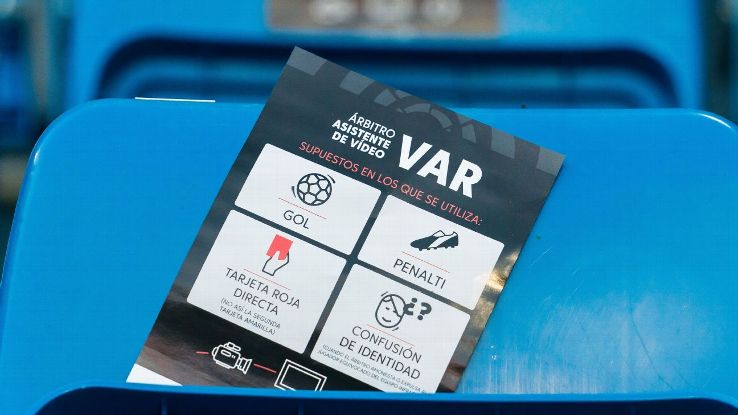


Spain’s Players’ Association is asking the Spanish League to abandon plans to play a La Liga match in the United States and claim a strike isn’t out of the question.
Sevilla’s Pablo Sarabia might be a pretty good quiz question in Spain one day. Not where did he start his career (EFMO Boadilla, in case you’re wondering) or what he’d be if he wasn’t a footballer (a ski instructor, apparently), but what he was the first person ever to do here. The answer, which you may know now but will probably have forgotten in a few years’ time, when hopefully all this fuss just seems a little silly, is simple: Sarabia scored the first-ever goal in Spanish football assisted by VAR.
Well, “Spanish football” — it was actually in Morocco — but anyway, in the Spanish Super Cup, Sarabia slotted past Marc Andre ter-Stegen. The flag went up, but a few seconds later, the verdict from the video room was in: goal. Sevilla led, and history had been made. It hadn’t taken long, and justice was done. No one could argue that it wasn’t right.
A week later, Sarabia’s team were playing again when the first-ever La Liga goal was given by VAR, scored by Andre Silva. Later on, Rayo got a penalty, also given by the VAR. In both cases, the video assistants had overruled referee Mateu Lahoz, and he could be a quiz question, too, only it would probably be too easy to guess.
Sevilla vs. Rayo was not the first game of the opening weekend in Spain. It was actually the fourth, and you could almost feel the frustration from some in the media as they waited for VAR to step centre-stage. It hadn’t been used during Girona vs. Valladolid, Betis vs. Levante, or Eibar vs. Huesca. And that, you might be tempted to judge, is a good thing.
Quique Setien, the Betis manager, and Jose Luis Mendilibar, the Eibar coach, wouldn’t agree though. In both games, there were potential penalties, on Sergio Canales and on Sergi Enrich, where the referee didn’t give it and didn’t look at the VAR either — as if that room with all the cameras and things didn’t even exist, as if there was no help at hand. And so, there were no penalties. Even though, watching it on the telly, there might well have been. Just as there might have been later that night at the Bernabeu.
What Setien wanted to know was: Why not? Why do they look some times and not others?
 Sarabia, centre, will be remembered as the player to score the first VAR goal in Spanish football.
Sarabia, centre, will be remembered as the player to score the first VAR goal in Spanish football.
“There are things that I find hard to understand,” he said. With his customary calm, dignified demeanour, the president of the league, Javier Tebas, said: “Only Setien and Mendilibar complained, and they lost.”
Tebas expressed his “surprise” that some still don’t understand the mechanism applied, and on one level, he has a point. There have been courses for clubs and the media. At Spanish grounds on the opening day of the season, there were leaflets and even messages on the electronic scoreboards explaining what VAR is for. Everyone is still learning and finding out.
It is early still. It’s short-sighted too to demand that it is perfect or insist that only perfection is an improvement — a significant reduction in injustice is surely beneficial, even if some remains — and for all the theory lessons, it will take a while to embrace its workings when it comes to the practicality. Not least because, while the idea that the VAR is only there for demonstratively wrong decisions, and players and managers have been told that, as former referee Iturralde Gonzalez keeps saying, at some level, it’s still always about interpretation. A simple example: Cards and fouls are more common in Spain than in the Premier League, and no one is seriously suggesting the game is dirtier there.
But whose interpretation? And that’s part of the point. Another part is what impact it has on the game beyond headline errors. What this might actually mean for the play. For the game, if not the result. And that is why, for all the flaws in his words, it is worth listening to Mendilibar and others, not just dismissing them. And certainly not dismissing him as nothing more than a manager who had lost.
To a greater or lesser extent, the result conditions everything everyone ever says. As Ernesto Valverde once put it: “What do you want to say? In my area, I think it’s not a penalty; in theirs, I think it is. And if you ask him [the opposition manager], he’ll say the opposite.”
But this is not about having lost. Especially when Mendilibar had started by insisting that his team had been “deservedly beaten” and had no excuse, when he didn’t even really talk about the penalty his team might have got, when he is one of the clearest, most direct and most honest managers there is, a man always prepared to admit his team’s failings.
Instead, Mendilibar talked about the way the game was played. And while there is no value in going over some of those broad debates now, many of which were amply addressed during the World Cup, the opening weekend in Spain posed that question again. The game is changing already; the way it is experienced — goal celebrations are turned off and on again, or don’t even really start in earnest, which might sound like something silly but it does change things — and the way it is played.
Players are “drawing” TV screens with their hands. From the Ipurua turf, Enrich shouted: “Have a look at it.” Players are also starting to let go, even if habits of a lifetime die hard. They know that if they grab an opponent now, they will probably get caught — it’s no coincidence that, of course, the penalties were up at the World Cup or that Adrian Embarba got one for Rayo — and eventually they will stop doing so or at least drastically reduce it.
Diving — and this is especially significant in Spain — should become pointless. Perhaps VAR can go from punishment to deterrent.
But that won’t be the only impact, at least in the short term, and focus should be diverted a little. Here’s Valverde again, speaking this week. A manager who won on the opening weekend, remember.
“The feeling is that video assistant referees and technology are here to help us, especially for justice in the penalty area, but we don’t know what knock-on effects it might have,” said Valverde. “I know everyone is focussed on what happens in the area, but in the World Cup final, France scored from a free-kick that wasn’t, and that decided the game. So what’s more important? I don’t know, because I’m also waiting to see how it all works out.”
As Jorge Valdano suggested during the World Cup, if the areas are policed, crimes will occur elsewhere instead. Where there is more freedom, misdemeanours may become “preventative.” Tactical fouls will take on greater significance: Foul now; don’t wait until later, when you can’t.
How far back will the checks go? How far should VAR intervene? What is to be revised and what’s not? Police cameras in hot spots or police cameras everywhere? And will cheats find another way? Once the law is made, the trap is laid, as the Spanish phrase has it.
“As football is continuous, a game that flows, it is worth asking how many goals are lost somewhere in the middle of the pitch as a result of these absolutely unsporting interruptions,” Valdano wrote, and there may be something in that. “As the World Cup brought us this refereeing revolution, it is worth reminding the judicial police who manage the VAR and the referees who abdicate responsibility, handing it instead to the men sitting before video screens, that their job remains the same as it always was: to protect the game and not become accomplices of the cheats and cynics who think they’re smart.”
 There is an education process around VAR, as shown by the leaflets put on seats at the Bernabeu prior to last Sunday’s game between Real Madrid and Getafe.
There is an education process around VAR, as shown by the leaflets put on seats at the Bernabeu prior to last Sunday’s game between Real Madrid and Getafe.
Mendilibar thought VAR was intervening too much already on the opening day. He was not impressed, but not because VAR got things wrong; rather, because he said it took too long to get anything at all. And, he fears, because it gives referees something “infallible” to hide behind, and even if only subconsciously, that, by definition, slows them down while they wait to be told the truth. He wasn’t pining for a victory but a little velocity.
“We couldn’t take a single free kick quickly or get the game going fast at any point because they were looking back at something, everything,” said Mendilibar. “I don’t know if the VAR is refereeing the game or the referee is refereeing it. It’s being run from Madrid not out on the pitch. It’s hard to get it wrong with the VAR, and referees don’t want to risk anything, just wait [and see the VAR]. In that sense, I didn’t like it at all. We’re ending up like American football.”
Mendilibar was partly wrong — unless it was erroneously applied, the VAR wasn’t revising everything, although it does increase the amount of communication and information a referee has to compute — but he was right to suggest that the risk is, of course, that the flow might be lost. And that in a league where stopping the game can sometimes seem too easy already.
As Valverde said: “I wouldn’t want VAR to interrupt the flow of games. The great thing about football is that it’s so fast, there are so few interruptions. The referees certainly need help, but this shouldn’t be to the detriment of the speed of the game.”
That is yet to be seen, but it, like the headline errors that occupy everyone, matters. Maybe even more, even if it gets noticed less. And the risk is being distracted from something that is actually deeper, even more important. The play. VAR will change decisions, and it will change the game itself, maybe for the better, maybe even very significantly, but it is worth opening the analysis beyond the inevitable attention given to a single moment: a goal, an offside, a penalty, something that may decide a game but not define it.
Pessimism suggests that VAR gets in the way of the actual football; optimism suggests it may create a cultural change that works so well as to not need to work at all, or only rarely. To become normal and seamless, to reach a point where no one remembers Sarabia and doesn’t really remember that there’s a room somewhere with endless cameras in it, or at least doesn’t feel like that room is intruding.
It may well be that the best thing VAR can do, the most lasting legacy it can have, is to effectively make itself redundant.

Be the first to comment